Filter by

Integrated groundwater management : concepts, approaches and challenges
The aim of this book is to document for the first time the dimensions and requirements of effective integrated groundwater management (IGM). Groundwater management is a formidable challenge, one that remains one of humanity’s foremost priorities. It has become a largely non-renewable resource that is overexploited in many parts of the world. In the 21st century, the issue moves from how to si…
- Edition
- -
- ISBN/ISSN
- 9783319235769
- Collation
- xiii, 762p. : ill.
- Series Title
- -
- Call Number
- 628.114 INT i
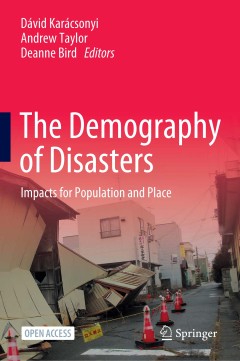
The demography of disasters : impacts for population and place
This open access book provides worldwide examples demonstrating the importance of the interplay between demography and disasters in regions and spatially. It marks an advance in practical and theoretical insights for understanding the role of demography in planning for and mitigating impacts from disasters in developed nations. Both slow onset (like the of loss polar ice from climate change)…
- Edition
- -
- ISBN/ISSN
- 9783030499204
- Collation
- xvii, 268p. : ill.
- Series Title
- -
- Call Number
- 363.34 DEM d
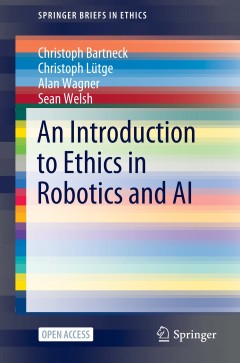
An introduction to ethics in robotics and AI
This open access book introduces the reader to the foundations of AI and ethics. It discusses issues of trust, responsibility, liability, privacy and risk. It focuses on the interaction between people and the AI systems and Robotics they use. Designed to be accessible for a broad audience, reading this book does not require prerequisite technical, legal or philosophical expertise. Throughout, t…
- Edition
- -
- ISBN/ISSN
- 9783030511104
- Collation
- xi, 117p. : ill.
- Series Title
- -
- Call Number
- 343.09944 INT i
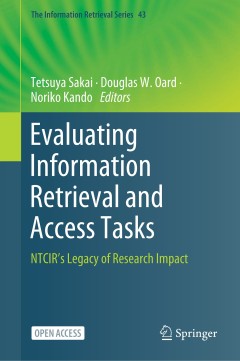
Evaluating information retrieval and access tasks : NTCIR's legacy of researc…
This open access book summarizes the first two decades of the NII Testbeds and Community for Information access Research (NTCIR). NTCIR is a series of evaluation forums run by a global team of researchers and hosted by the National Institute of Informatics (NII), Japan. The book is unique in that it discusses not just what was done at NTCIR, but also how it was done and the impact it has achiev…
- Edition
- -
- ISBN/ISSN
- 9789811555541
- Collation
- xiii, 219p. : ill.
- Series Title
- -
- Call Number
- 005.74 EVA e
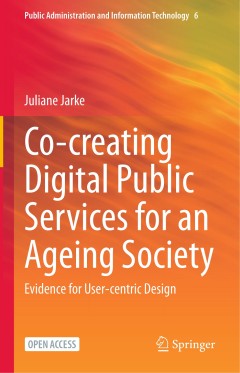
Co-creating digital public services for an ageing society : evidence for user…
This open access book attends to the co-creation of digital public services for ageing societies. Increasingly public services are provided in digital form; their uptake however remains well below expectations. In particular, amongst older adults the need for public services is high, while at the same time the uptake of digital services is lower than the population average. One of the reasons i…
- Edition
- -
- ISBN/ISSN
- 9783030528737
- Collation
- xviii, 228p. : ill.
- Series Title
- -
- Call Number
- 352.3802854678 JAR c

Autonomous driving : technical, legal and social aspects
This book takes a look at fully automated, autonomous vehicles and discusses many open questions: How can autonomous vehicles be integrated into the current transportation system with diverse users and human drivers? Where do automated vehicles fall under current legal frameworks? What risks are associated with automation and how will society respond to these risks? How will the marketplace rea…
- Edition
- -
- ISBN/ISSN
- 9783662488478
- Collation
- xv, 706p. : ill.
- Series Title
- -
- Call Number
- 629.22 AUT a

Design science and its importance in the German mathematics educational discu…
This ICME-13 Topical Survey reviews the state-of-the-art by first exploring the roots and scope of design science. Second, it presents two examples of current design science projects that focus on substantial learning environments including a student and a teacher perspective. Subsequently, the book elaborates on how empirical research can be conceptualised within design science. Lastly, it exp…
- Edition
- -
- ISBN/ISSN
- 9783319435428
- Collation
- vii, 43p. : ill.
- Series Title
- -
- Call Number
- 510.71 DES d
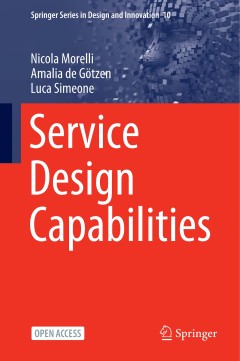
Service design capabilities
This open access book discusses service design capabilities in innovation processes, and provides a framework that guides design students, practitioners and researchers towards a better understanding of operational aspects of service design processes. More specifically, it revisits service designers’ capabilities in light of the new roles that have opened up in innovation processes on differe…
- Edition
- -
- ISBN/ISSN
- 9783030562823
- Collation
- xv, 89p. : ill.
- Series Title
- -
- Call Number
- 658 MOR s

Extreme values and financial risk
Since the 2008 financial crisis, modeling of the extreme values of financial risk has become important. Postgraduate programs and PhD research programs in mathematical finance are cropping up in nearly every university. Additionally, many conferences are being held annually on the topic of extreme financial risk. The aim of this Special Issue is to provide a collection of papers from leading ex…
- Edition
- -
- ISBN/ISSN
- 9783038974406
- Collation
- -
- Series Title
- -
- Call Number
- 657.7
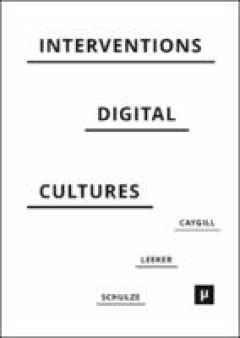
Interventions in digital cultures : technology, the political, methods
How to intervene? Interventions are in vogue in digital cultures as forms of critique or political actions into public spheres. By engaging in social, political, and economic contexts, interventions attempt to interrupt and change situations—often with artistic means. This volume maps methods of interventions under the specific conditions of the digital. How are interventions shaped by these …
- Edition
- -
- ISBN/ISSN
- 9783957961112
- Collation
- 148 p.; 23 cm.
- Series Title
- -
- Call Number
- 300 INT i
 Computer Science, Information & General Works
Computer Science, Information & General Works  Philosophy & Psychology
Philosophy & Psychology  Religion
Religion  Social Sciences
Social Sciences  Language
Language  Pure Science
Pure Science  Applied Sciences
Applied Sciences  Art & Recreation
Art & Recreation  Literature
Literature  History & Geography
History & Geography